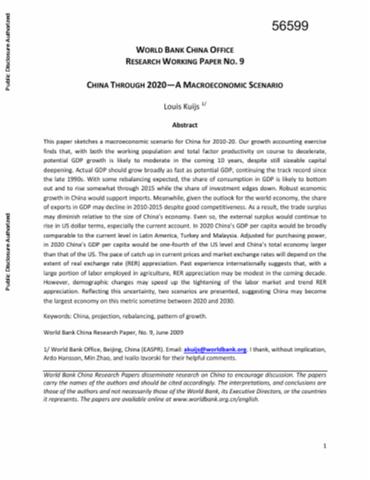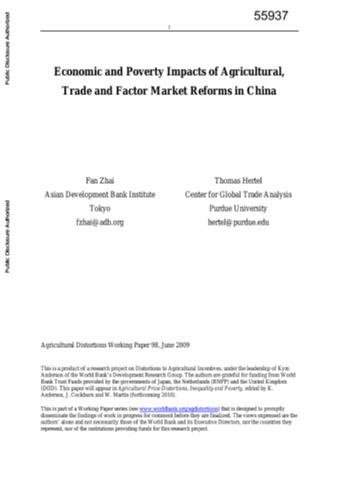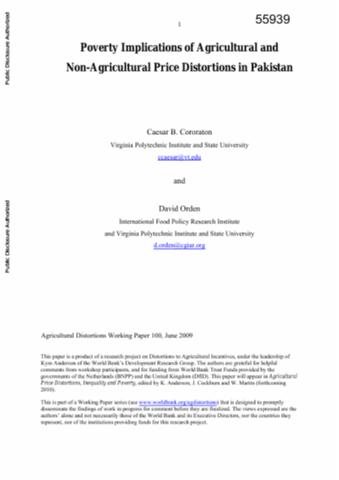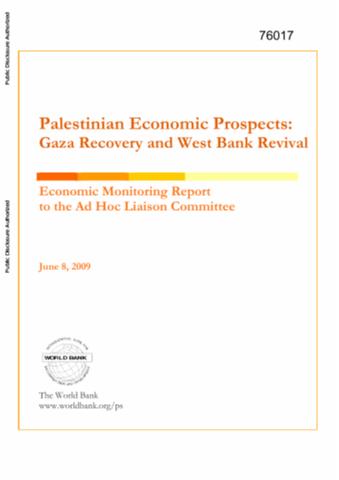The World Bank is a vital source of financial and technical assistance to developing countries around the world. We are not a bank in the ordinary sense but a unique partnership to reduce poverty and support development. The World Bank Group has two ambitious goals: End extreme poverty within a generation and boost shared prosperity.
- To end extreme poverty, the Bank's goal is to decrease the percentage of people living on less than $1.25 a day to no more than 3% by 2030.
- To promote shared prosperity, the goal is to promote income growth of the bottom 40% of the population in each country.
The World Bank Group comprises five institutions managed by their member countries.
The World Bank Group and Land: Working to protect the rights of existing land users and to help secure benefits for smallholder farmers
The World Bank (IBRD and IDA) interacts primarily with governments to increase agricultural productivity, strengthen land tenure policies and improve land governance. More than 90% of the World Bank’s agriculture portfolio focuses on the productivity and access to markets by small holder farmers. Ten percent of our projects focus on the governance of land tenure.
Similarly, investments by the International Finance Corporation (IFC), the World Bank Group’s private sector arm, including those in larger scale enterprises, overwhelmingly support smallholder farmers through improved access to finance, inputs and markets, and as direct suppliers. IFC invests in environmentally and socially sustainable private enterprises in all parts of the value chain (inputs such as irrigation and fertilizers, primary production, processing, transport and storage, traders, and risk management facilities including weather/crop insurance, warehouse financing, etc
For more information, visit the World Bank Group and land and food security (https://www.worldbank.org/en/topic/agriculture/brief/land-and-food-security1
Resources
Displaying 4721 - 4725 of 4907China through 2020
This paper sketches a macroeconomic scenario for China for 2010-20. Growth accounting exercise finds that, with both the working population and total factor productivity on course to decelerate, potential gross domestic product (GDP) growth is likely to moderate in the coming 10 years, despite still sizeable capital deepening. Actual GDP should grow broadly as fast as potential GDP, continuing the track record since the late 1990s.
Economic and Poverty Impacts of Agricultural, Trade, and Factor Market Reforms in China
Capitalizing on the most recent estimates of agricultural price distortions in China and in other countries, this paper assesses the economic and poverty impact of global and domestic trade reform in China. It also examines the interplay between the trade reforms and factor market reforms aimed at improving the allocation of labor within the Chinese economy. The results suggest that trade reforms in the rest of the world, land reform and hukou reform all serve to reduce poverty, while unilateral trade reforms result in a small poverty increase.
Poverty Implications of Agricultural and Non-Agricultural Price Distortions in Pakistan
Using recent estimates of industry assistance rates, the effects of trade liberalization in the rest of the world and in Pakistan alone are analyzed using a global and a Pakistan computable general equilibrium (CGE) model under two tax replacement schemes: a direct income tax and an indirect tax replacement. The results indicate that the distributional and poverty effects in Pakistan of a unilateral liberalization of all traded goods are significantly greater than the effects of trade liberalization in the rest of the world.
Palestinian Economic Prospects
In its report to the September 22, 2008 meeting of the Ad Hoc Liaison Committee (AHLC), the World Bank noted that the Palestinian Authority (PA), Israel, and the international donor community made some progress on the three parallel conditions for Palestinian economic revival, albeit to different degrees. The report notes the dramatic impact of Israel s recent three-week offensive in Gaza and analyzes the variety of recovery and reconstruction schemes being explored by the donor community.
The Evolution of the World Bank’s Land Policy: Principles, Experience, and Future Challenges
This article examines the evolution of policy recommendations concerning rural land issues since the formulation of the World Bank’s “Land Reform Policy Paper” in 1975. That paper set out three guiding principles: the desirability of owner-operated family farms; the need for markets to permit land to be transferred to more productive users; and the importance of an egalitarian asset distribution.










